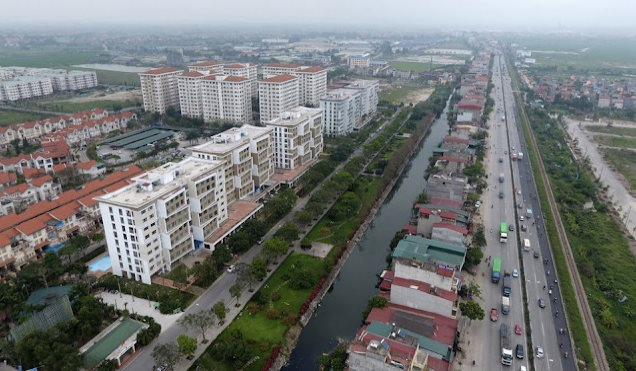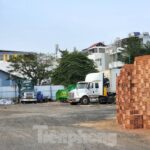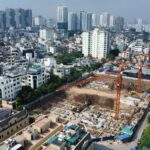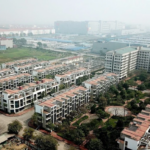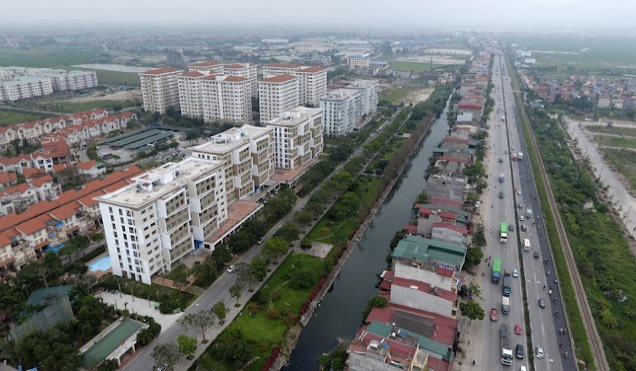
Addressing the existing issues in social housing development requires a new mindset in management and administration. (Int)
Existing Issues Remain Unresolved
Although there have been significant breakthroughs in the implementation of the project to build at least one million social housing units for low-income earners and industrial park workers during the 2021-2030 period, there are still some issues and limitations that have not been addressed or resolved in the process of realizing the social housing policy.
Firstly, the land fund for social housing development remains limited. Many localities have not allocated land reasonably for social housing development. In some cases, land has been allocated but lacks the necessary infrastructure, making it unsuitable for project implementation. Mostly, investors have to find the land themselves, conduct site clearance, which is costly and challenging, driving up prices and making this segment less attractive.
Secondly, the procedures for investing and selecting investors for social housing projects are complicated. The procedures for approving investors and implementing social housing projects are not much different from those for commercial housing projects and are sometimes even more complex and subject to greater scrutiny due to specific appraisal steps such as approving selling prices and reviewing eligible beneficiaries.
Thirdly, the capital and credit mechanisms for social housing are also inappropriate. Social housing development relies mainly on enterprises’ capital and bank credit. Although there have been efforts to reduce interest rates, the interest rate of the VND 120,000 billion package for this specific segment remains high, the term is short, and it is unsuitable for both investors and low-income homebuyers. In addition, there is a lack of stable medium and long-term capital sources from the budget, housing development funds, or trust funds to ensure sustainable investment in this segment.
The implementation of the project also faces challenges due to a lack of supportive mechanisms at the local level. Many localities have not proactively included social housing development targets in their housing development plans for the period and have not issued specific mechanisms to support enterprises investing in social housing. In addition to procedural difficulties, social housing projects also face challenges in production and business activities, such as input price fluctuations, import-export difficulties, and continuous changes in labor, consulting, and other costs. The mechanism for implementing the 20% land fund in commercial housing projects for social housing development has not been clearly and specifically guided, causing confusion for many localities in determining the location, organizing bidding to select investors, and constructing, leading to the underutilization or misuse of this land fund.
Especially, many localities lack determination in implementing the project. The identification of beneficiaries in some localities is confusing and lacks detailed guidance. Some groups of seasonal workers, military personnel, and people with salaries close to the prescribed threshold have not been able to access the policy.
A New Mindset is Needed to Address the Existing Issues
To address these issues, VARS believes that it is necessary to ensure housing for policy beneficiaries, laborers, producers, traders, and those engaged in other activities. Specifically, VARS proposes the following:
Regarding the land fund, localities need to plan and allocate specific and reasonable land funds for social housing development and include this target in the five-year and annual housing development programs. It is necessary to apply mechanisms for land retrieval and compensation for site clearance from the budget or through BT, PPP, or land-for-infrastructure swaps to proactively create clean land funds. Enterprises with available land funds should be encouraged to develop social housing through support mechanisms for land-use conversion and financial obligation exemptions. At the same time, support should be provided to convert inappropriate projects or land funds into social housing.
Regarding investment procedures and investor selection, to encourage enterprises to participate in social housing development, it is necessary to streamline the investment approval process and simplify investor selection procedures through a transparent and open bidding process. Investor selection conditions should also be minimized, such as business conditions, capacity, capital, and experience. Post-inspection should be applied instead of pre-inspection for non-core content, and overlapping procedures that prolong the project approval time should be cut.
Regarding capital sources, it is necessary to establish social housing development funds at the central and local levels, using land fund revenues, budget allocations, and contributions from enterprises and industrial parks. At the same time, promote the development of investment fund models and real estate trust funds focused on the social housing segment. In parallel, issue specific credit policies with low-interest rates and long-term, flexible repayment terms for both investing enterprises and low-income homebuyers.
Regarding local mechanisms, localities must proactively issue supportive policies suitable to their specific needs: developing rental housing, diversifying models, and accurately identifying target groups with genuine needs. Strengthen inspection, supervision, and strict handling of policy profiteering, harassment, and obstruction in implementation.
Regarding output policies, it is necessary to streamline and simplify procedures for identifying beneficiaries, shifting from pre-inspection to post-inspection. Implement support policies for rental and rent-to-own options for workers who cannot afford to buy houses. Build a national database for social housing to ensure fairness, transparency, and synchronization in access.
VARS believes that addressing the existing issues requires a new mindset in management and administration: considering social housing development as a mandatory task in the socio-economic development strategy of each locality and the leading responsibility of the State, rather than leaving it to market mechanisms. Only when social housing becomes an integral part of urban planning, attractive to enterprises, easily accessible to people, and has a stable operating mechanism, will the project to build at least one million social housing units achieve high results, contributing to a harmonious, humane, and sustainable society.
The Bureaucratic Stranglehold: How Red Tape is Stifling Vietnamese Businesses at Home
“A significant number of private enterprises in Ho Chi Minh City are facing obstacles to their growth due to bureaucratic red tape, high financial costs, and an uneven playing field in the business environment. These challenges are preventing them from reaching their full potential and hindering their ability to scale up their operations.”
Unveiling the Progress of Hanoi’s Anticipated Social Housing Project
After more than 5 months of construction, the social housing project on land lot NO1 in the new Ha Dinh urban area (Hanoi) is currently undergoing basement work and is expected to be completed by July 2025. The timely completion of this project will facilitate the process of receiving applications from individuals and families seeking affordable housing options in the area.
Making Way for 100,000 Affordable Homes
To meet the target of delivering 100,000 social housing units by 2030 as set by the Prime Minister, Ho Chi Minh City is leaving no stone unturned with a slew of initiatives.

